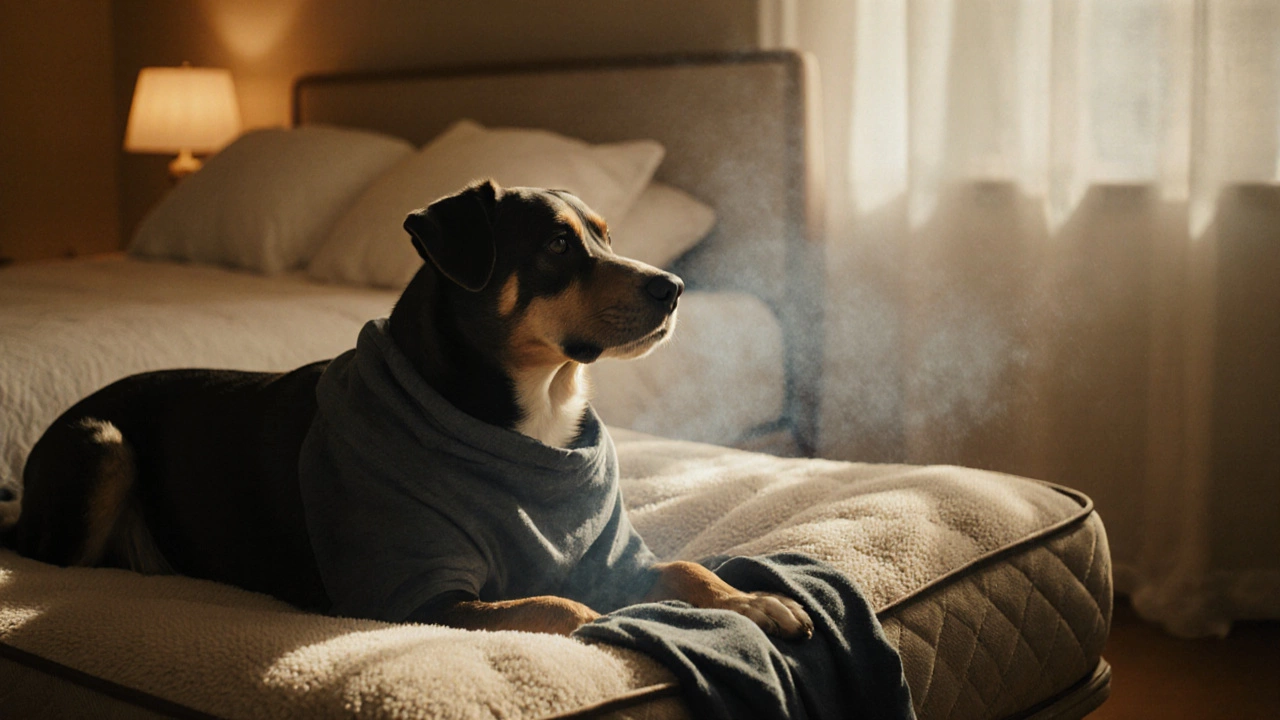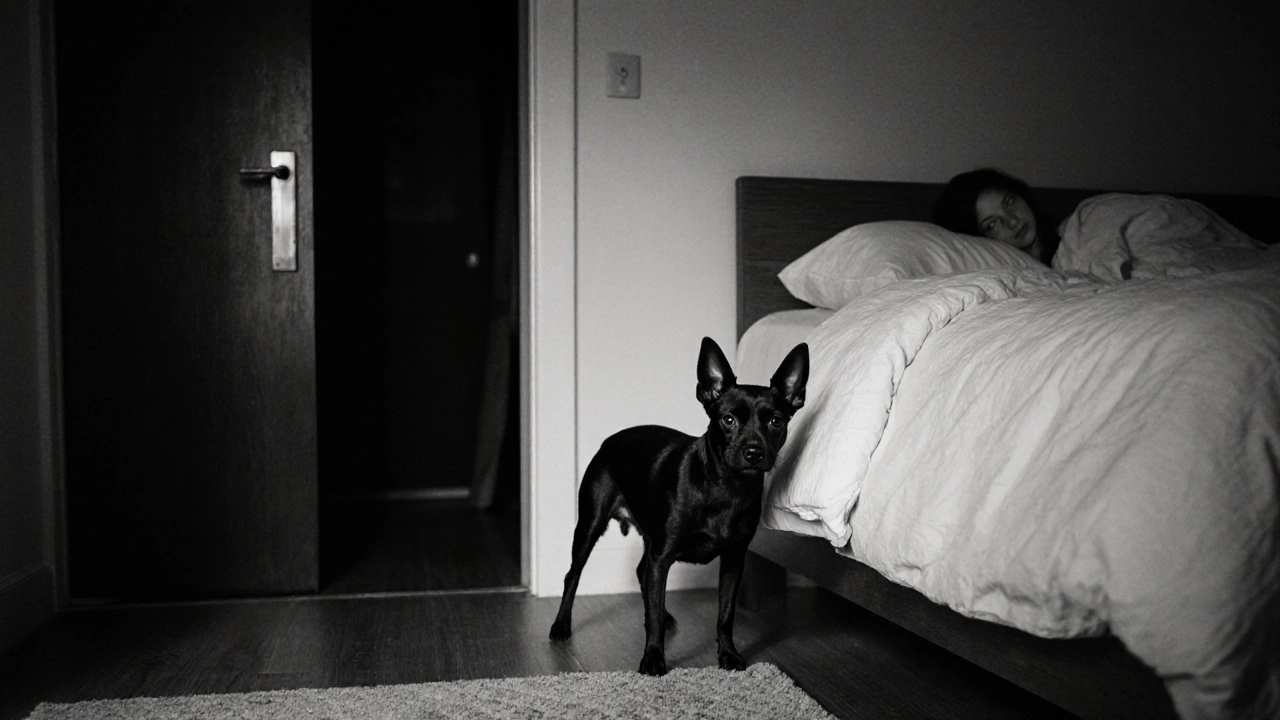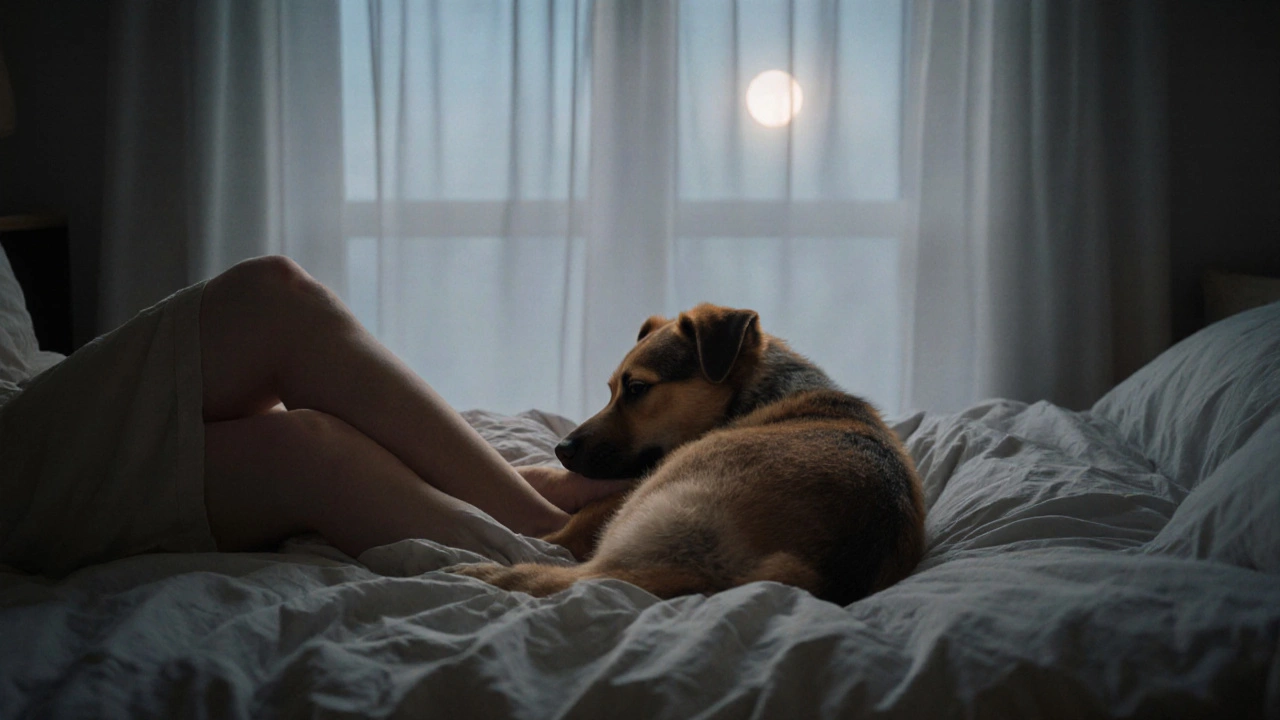Ever wake up to your dog curled up against your leg, or find them sprawled across the pillow like they own it? You’re not alone. Millions of dog owners wonder why their dog insists on sleeping right next to their bed-instead of in their own cozy dog bed across the room. It’s not just about comfort. There’s a mix of instinct, emotion, and learned behavior driving this habit. And understanding it can help you decide whether to encourage it-or gently redirect it.
They see you as their pack leader
Dogs are descendants of wolves, and wolves sleep in close contact with their pack. It’s not just about warmth-it’s about safety. In the wild, sleeping near the alpha meant protection from predators and a sense of belonging. Your dog doesn’t think of you as their human. They think of you as their pack leader. Sleeping next to your bed is their way of staying close to the person they trust most. It’s a sign of loyalty, not just cuddliness.Studies from the University of Lincoln in 2018 showed that dogs who sleep near their owners have lower stress hormone levels when awakened suddenly. That’s not coincidence. Your presence calms them. Even if they nap on the floor beside you, they’re choosing proximity over privacy.
It’s their version of a dog bed-just better
You bought them a plush orthopedic dog bed. You placed it right by the door, warm and inviting. And yet, they ignore it. Why? Because your bed is warmer, softer, and smells like you. Dogs have an incredibly strong sense of smell-up to 100,000 times more sensitive than humans. The scent of your skin, your shampoo, your laundry detergent-it’s comforting. It’s familiar. It’s home.A 2020 survey of 1,200 dog owners in New Zealand found that 78% of dogs preferred sleeping on or near their owner’s bed over their own bed, even when the dog bed was identical in material and placement. The difference? Human scent. Your dog isn’t being stubborn. They’re just following their nose.
Separation anxiety might be at play
If your dog follows you everywhere-into the bathroom, the kitchen, even while you’re showering-and panics when you leave the room, their need to sleep next to you might be rooted in anxiety. Separation anxiety isn’t just about barking or chewing. It’s about physical closeness as a coping mechanism.Signs to watch for: pacing before you go to bed, whining if you move away, panting or drooling when you’re out of sight, or waking you up at 3 a.m. because they’re suddenly “alone.” This isn’t clinginess-it’s distress. If your dog only settles when touching you, and becomes visibly upset if you shift even slightly, it’s worth talking to a certified dog behaviorist. In New Zealand, organizations like the NZ Companion Animal Council offer low-cost consultations for this exact issue.

They’re protecting you
Dogs are natural guardians. Even the tiniest Chihuahua will bark at a shadow. That instinct doesn’t disappear just because they live in a city apartment. Sleeping next to your bed puts them in the perfect position to alert you to anything unusual-a creaking floorboard, a stranger outside, a smoke alarm going off.It’s not that they think you’re helpless. It’s that they feel responsible for you. In their mind, you’re the vulnerable one. They’re the lookout. This behavior is especially common in breeds historically used for guarding-Rottweilers, Dobermans, even small terriers. It’s not about dominance. It’s about duty.
It’s learned behavior-probably from you
You let them up once. Then twice. Then you didn’t mind when they pushed the pillow aside. Soon, they’re claiming the whole side of the bed. You didn’t train them to do this. But you didn’t stop it either. Dogs learn through repetition and reward. If they jump onto the bed and you smile, pat them, or don’t say no-that’s positive reinforcement. Even a sigh or a half-hearted “not again” counts as attention.It’s not malicious. It’s simple operant conditioning. If you want to change the habit, you need to change the reward. That means being consistent. No exceptions. No “just this once.” If you let them up on weekends but not weekdays, they’ll learn to wait until Saturday night.

What to do if you want them to sleep elsewhere
You love your dog. But you also need your space. Maybe you’re a light sleeper. Maybe you have allergies. Maybe you just want to sleep without a 70-pound weight on your legs. That’s okay. You can still bond with your dog without sharing your bed.- Place a high-quality dog bed right next to your bed-on the floor, not across the room. Use a bed with raised edges and your old T-shirt tucked inside for scent.
- Make it irresistible. Warm it up with a heating pad (low setting) before bedtime. Spritz it with a pheromone spray like Adaptil.
- Use positive reinforcement. When they choose their own bed, give them a treat and quiet praise. Don’t reward them for climbing onto yours.
- Be patient. It can take 2-4 weeks for a dog to fully adjust, especially if they’ve been sleeping with you for years.
Don’t use punishment. Yelling, shoving them off the bed, or closing the door only increases anxiety. You’re not being mean-you’re being clear. And dogs respond better to calm consistency than to force.
When it’s perfectly fine to let them stay
Not every dog needs to be retrained. If your dog is calm, quiet, and doesn’t disrupt your sleep, there’s no reason to change things. In fact, sleeping with your dog has real benefits. A 2022 study from the Mayo Clinic found that people who slept with their dogs reported better sleep quality-so long as the dog didn’t move around a lot or snore.For older adults, people with depression, or those recovering from trauma, the presence of a dog can reduce loneliness and increase feelings of safety. If your dog helps you feel grounded at night, that’s a gift-not a problem.
The key is mutual comfort. If you wake up rested, and your dog looks peaceful, you’ve got a good system. If you’re constantly adjusting pillows or waking up with a paw on your face, then it’s time to make a gentle change.
What about dog beds? Are they useless?
No. Dog beds aren’t useless-they’re just not the whole story. A good dog bed should be:- Orthopedic for older dogs with joint pain
- Washable (because dogs track in dirt, shed, and sometimes have accidents)
- Size-appropriate (your dog should be able to stretch out fully)
- Placed in a quiet, draft-free corner
But even the best dog bed won’t compete with your scent, your warmth, or your rhythm. That’s why the goal isn’t to replace your bed-it’s to give your dog a better alternative that still feels like home.
Why does my dog sleep on my pillow instead of their bed?
Your pillow carries your scent and is warmer than most dog beds. Dogs are drawn to familiar smells and heat. Even if their bed is expensive, it doesn’t smell like you. Try placing a worn T-shirt in their bed to make it more appealing.
Is it bad for my dog to sleep with me?
Not necessarily. For most healthy dogs and owners, sharing a bed is safe. But if your dog has anxiety, aggression, or health issues like allergies or skin conditions, it’s better to keep them on the floor. Also, if you’re a deep sleeper and your dog moves a lot, you might both sleep better apart.
Can I train an older dog to sleep in their own bed?
Yes, but it takes patience. Older dogs have habits that are harder to break. Start by placing their bed right next to yours. Reward them every time they choose it. Use treats, calm praise, and a consistent bedtime routine. Avoid forcing them-this can cause stress. With consistency, most dogs adapt within 3-4 weeks.
My dog whines when I close the door at night. What do I do?
Whining often means separation anxiety. Don’t open the door every time they cry-that teaches them whining works. Instead, make sure their bed is cozy, warm, and has your scent. Leave a radio or white noise machine on. If it continues, consult a certified dog behaviorist. In Wellington, the Animal Welfare League offers free behavioral assessments for residents.
Do all dogs want to sleep with their owners?
No. Some breeds, like Greyhounds or Basenjis, are more independent. Some dogs simply prefer their own space. If your dog sleeps across the room and seems happy, don’t force closeness. Not every dog craves physical contact-even if they love you deeply.
